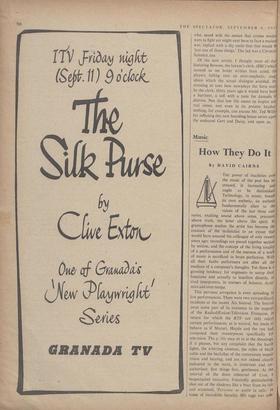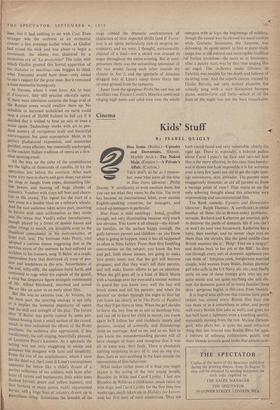Music
How They Do It
By DAVID CAIRNS
THE power of machines over the music of the past has in- creased, is increasing and ought to be diminished. Technology, in music, breeds its own resthetic, an aesthetic fundamentally alien to the values of the last• three cen• turies, exalting sound above sense, precision above truth, the letter above the spirit. In, gramophone studios the artist has become the creature of the technician to an extent that would have amazed his colleague of only twenty years ago; recordings are pieced together section by section, and the concept of the living totality of a performance and of the oneness of a work of music is sacrificed to brute perfection. Witb all their faults performers are after all the medium of a composer's thoughts. Yet there is a growing tendency for engineers to usurp their functions and actually to interfere directly. as rival interpreters, in matters of balance, dyna- mics and even tempo.
This parvenu arrogance is even spreading to live performances. There were two extraordinary incidents at the recent Aix festival. The festival owes some part of its existence to the support of the Radiodiffusion-Television Francaise, in return for whin the RTF not only relays certain performances, as is natural, but tends to behave as if Mozart, Haydn and the rest had composed their masterpieces specifically for television. The p: blic may sit in at the shootings, if it pleases, but any complaint that the harsh lights, the whirring cameras, the miles of black cable and the backchat of the cameramen impair vision and hearing, and are not indeed clearly indicated in the score, is irrelevant and un- authorised; first things first, gentlemen, At the interval of the dress rehearsal of Cos?, a ' bespectacled executive, frenziedly gesticulating, shot out of the shadows like a boar from its lair and screamed, 'Personne ne quitte la salle,' 10 tones of incredible ferocity. His rage was sub- lime, but it had nothing to do with Cosi. Even stranger was the outburst at an orchestral concert a few evenings earlier when, as Giulini had raised his stick and was about to begin a movement, the silence was shattered by a stentorian cry of 'La projecteurf The calm with which Giulini greeted this horrid apparition of the diabolus ex machina—one boggles to think what Toscanini would have done—only added to one's respect for the great man. But it remained a most damnable incongruity.
At Verona, where I went from Aix to hear 11 Trovatore, they still practise old-style opera. If there were television cameras the huge oval of the Roman arena would swallow them up. No schedule or harassed technician on earth could stop a crowd of 20,000 Italians in full cry if it decided that it wished to hear an aria or even a scene again. Technology works with art to pro- duce scenery of vertiginous scale and bountiful extravagance, but quite appropriate. Here, in its perfect gladiatorial expression, and somewhat purified, more efficient, but essentially unchanged, is the ancient Italian tradition of opera as a first- class sporting event.
All the way up the sides of the amphitheatre are the lights of thousands. of candles, lit by the spectators just before the overture. After each scene wiry men in shorts and gym shoes run about the stage or dangle from ropes, dismantling life- size towers and bearing off huge chunks of masonry. Vendors with trays sell beer and choco- late to the crowd. The signal for the start of a new scene is a double blast on a referee's whistle.
And the vast audience takes active part, receiving its heroes with such acclamation as they stride into the arena that Verdi's softer introductions, though played by a forest of double basses and other strings to match, are inaudible even to the impatient connoisseur in his poltronissima, or front stall, seat. The baritone Aldo Protti, who adopted a curious stance suggesting that in the nervous stress of the moment he had suffered an accident to his trousers, sang 'Ii Balen' at a crude, remorseless forte that destfoyed all trace of pas- sion and tenderness in the aria. Nevertheless at the end, willy-nilly, the applause burst forth, and continued to rage while the captain of the guard, a stout but desperate figure strangely reminiscent of Mr. Alfred Hitchcock, mouthed and sawed the air like an actor in an early silent film. But this was an extreme case. At Verona, for the most part, the sporting analogy is apt only eN it implies the immense popularity of opera and the skill and strength of the play. The furore after 'll Balen' was partly caused by some per- cipient booing from a small section of the crowd, which in turn redoubled the efforts of the Protti partisans; the audience also appreciated, if less vociferously, the soft singing, beautifully phrased, of Leontyne Price's Leonora. As a spectacle the setting was not only staggering in sweep and grandeur but designed with taste and simplicity.. From the rim of the amphitheatre, where I went for the third act, the Count di Luna's encampment appeared far below like a child's dream of a perfect collection of toy soldiers, with layer after layer of turrets and battlements, little white tents flanked by red, green and yellow banners, real fires burning at many points, richly caparisoned horses, and a huge host of infantry drawn up in punctilious array. Sometimes the breadth of the stage robbed the dramatic confrontation of characters of their expected thrills (and 11 Trova- tore is an opera particularly rich in surprise en- counters), and we were, I thought, unreasonably cheated of a duel—not a sword was crossed in anger throughout the entire evening. But in com- pensation there was the astonishing splendour of the two armies facing each other outside the cloister in Act 2, and the spectacle of Azucena dragged into di Luna's camp down thirty feet of steep ground from the ramparts.
Apart from the egregious Protti the cast was an excellent one. Franco Corelli's Manrico combined ringing high notes and solid tone over the whole compass with at lept the beginnings of subtlety, though the casual way he cleared his nasal cavities while Giulietta Simionato, the Azucena, was delivering 'Ai nostri monti' to him at point-blank range was in thit ancient and incorrigible tradition of Italian tenordom—the more so as Simionato, after a patchy start, was by that time singing like an angel. The orchestra under Oliviero de Fabritiis was notable for the depth and fullness of its, string tone. And the superb chorus, trained by Giulio Bertola, not only looked plausible but actually sang with a nice distinction between piano, mezzo-forte and forte—which of all the feats of the night was not the least remarkable.



































 Previous page
Previous page